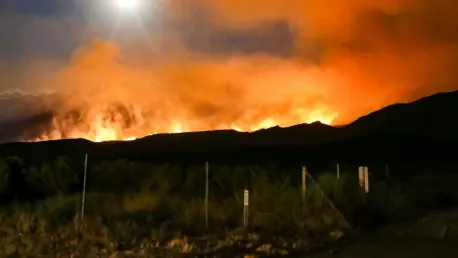House Bill 3666 has recently been the subject of intense scrutiny in Oregon, as lawmakers aim to enforce stricter wildfire mitigation practices for utility companies. This new legislation seeks to strike a delicate balance between ensuring robust wildfire prevention measures and controlling the financial impact on utility companies and their customers. The bill’s intent is clear: to prevent future disasters akin to the deadly and damaging wildfires that plagued the state just a few years ago. However, there are diverse opinions regarding its adequacy and potential implications.
Background and Initial Concerns
House Bill 3666 was introduced following the catastrophic Oregon wildfires, which resulted in significant loss of life and considerable property damage. The 2020 wildfires, in particular, were a wake-up call, with 11 lives lost and 4,000 homes destroyed. Initial drafts of the bill sparked controversy as critics feared that the proposed wildfire prevention certificates for utilities could inadvertently shield them from liability, even in cases of negligence. The bill’s initial wording implied that utilities, by obtaining these certificates, could use them to demonstrate they had “acted reasonably” according to state standards. This concern was particularly pronounced given the recent landmark verdict finding PacificCorp negligent in the 2020 Labor Day fires, which resulted in the company being ordered to pay more than $1 billion in damages.
Key Amendments and Legislative Adjustments
Amidst growing concerns, lawmakers made crucial amendments to House Bill 3666 to ensure it wouldn’t provide immunity to utility companies. The revisions clarified that the wildfire safety certificates merely confirm compliance with state standards at the time of issuance, without serving as automatic proof of reasonable conduct during wildfire incidents. Representative Pam Marsh, who introduced the bill, emphasized that the amendments aim to eliminate any conflicting interpretations and disputes surrounding the bill’s purpose and implications for utility liability. These changes sought to reassure the public that the certificates were not a “get out of jail free” card for utility companies, ensuring that they would still be held accountable in the event of negligence.
The revised bill, introduced in the House Judiciary Committee, now explicitly states that obtaining a certificate does not equate to automatic proof of reasonable behavior during wildfire incidents. The certificates are designed to confirm that utility companies have implemented wildfire safety policies consistent with state standards at the time of issuance. While this adjustment addressed some immediate concerns, questions about the bill’s practical enforcement and effectiveness remain.
Stakeholder Reactions and Ongoing Concerns
Despite the amendments, several stakeholders, including the Oregon Trial Lawyers Association and representatives from the timber industry, voiced ongoing concerns. They feared that courts might still give undue weight to the certificates when determining liability and argued that the bill fails to empower the Public Utility Commission to enforce and audit utilities’ wildfire mitigation practices effectively. The Oregon Trial Lawyers Association and stakeholders in the timber industry expressed frustration that the bill, although well-intentioned, lacked essential enforcement mechanisms and resources.
Advocates like Cody Berne stressed that the bill does little more than reiterate existing safety rules without providing the necessary resources or mechanisms to ensure utility companies’ compliance with those rules. Berne, representing survivors of the 2020 Labor Day fires, pointed out that rehashing current regulations without boosting the enforcement capabilities of the Public Utility Commission (PUC) would not lead to significant changes in utility practices. The lack of comprehensive state investigation or reports on the past wildfires further fueled skepticism about the bill’s real-world impact.
Support for State Standards and Certification Processes
On the other hand, supporters of the bill, such as Douglas Electric Cooperative’s general manager, highlighted the importance of establishing clear state standards and a certification process to guide investment in wildfire mitigation. These standards are essential to prevent disproportionately high mitigation costs from driving up electricity rates and economically displacing residents. Without a uniform set of guidelines, the financial burden of wildfire mitigation could become unsustainable, pushing more residents into financial hardship.
Utility representatives from Portland General Electric and the Oregon Rural Electric Cooperative Association echoed this sentiment, emphasizing the balance needed between rigorous wildfire mitigation standards and maintaining affordable utility rates for consumers. They believe that standardizing the state’s wildfire mitigation practices would enable more predictable and strategic investments in safety measures, ultimately benefiting both companies and customers.
Call for Stronger Regulatory Authority
House Bill 3666 has garnered significant attention in Oregon as legislators push for stricter wildfire mitigation practices for utility companies. The proposed legislation aims to find a fine balance between implementing strong wildfire prevention measures and managing the financial repercussions for utility providers and their customers. The main goal of the bill is unambiguous: to avert future disasters similar to the deadly and destructive wildfires that ravaged the state a few years back. Nonetheless, opinions vary widely on its effectiveness and potential impacts. Some argue that the bill is necessary for protecting communities and ecosystems, while others worry about the economic strain it may impose and question if it fully addresses the complexities of wildfire mitigation. As the debate continues, Oregon’s lawmakers must navigate these concerns while formulating policies that safeguard both lives and livelihoods, ensuring that the state’s residents are not left vulnerable to unpredictable and devastating fire events.









